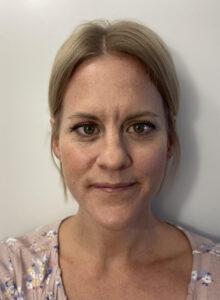Voting will be from 26th July to 25th August 2022
Four biocurators have been nominated for this award. As an ISB member you are invited to vote for one of the nominees described below. If you are an ISB member and did not receive an invite, please send an email to: isb@biocurator.org.
The winner of the Early Career Award will be awarded a prize of 500CHF and will give a 15 minute talk at a virtual ISB conference. In addition, they will have agreed to give their name, bio and photograph included on the ISB website, newsletter (circulated via the ISB distribution list) and twitter account.
Lauren Chan, Oregon State University, Corvallis, OR, USA.
Lauren Chan is a Nutrition PhD Candidate with three years of experience in biomedical ontologies under the supervision of Melissa Haendel. Lauren’s educational background is focused in nutrition and dietetics, which she leverages in her work focused on investigating nutrition and environmental exposure impacts on disease. Lauren is a regular contributor to a variety of OBO Foundry ontologies including the Food Ontology, Compositional Dietary Nutrition Ontology, and Mondo Disease Ontology. Her work has been integral for quality improvement of existing ontology content, as well as creation of essential hierarchies focused on nutrition and environmental exposures.
Lauren is a lead curator for the Environmental Conditions, Treatments, and Exposures Ontology (ECTO) She conducts this effort as a part of the Monarch Initiative, and she is working towards integration of exposure content with disease and phenotype information within the Monarch knowledge graph. She is also a passionate collaborator, working with multiple international, interdisciplinary teams on curation projects.
Lauren is an active member of a variety of biocuration community efforts, including serving as a Program Committee Member for ICBO 2021, and as a Coordinating Team Member for the 2021 and 2022 Integrated Food Ontology Workshops (IFOW). Her commitment to learning and the dissemination of knowledge benefits the biocuration community, and also individuals in the nutrition community who are eager to harness opportunities using biomedical ontologies.
While she is still early in her career, it is evident that Lauren has and will continue making meaningful impacts to the biocuration field and exposure sciences.
- Chan, L., Thessen, A., Duncan, W. D., Matentzoglu, N., Schmitt, C., Grondin, C., Vasilevsky, N., McMurry, J., Robinson, P., Mungall, C. J., & Haendel, M. (2022). The Environmental Conditions, Treatments, and Exposures Ontology (ECTO): Connecting Toxicology and Exposure to Human Health and Beyond. https://doi.org/10.5281/zenodo.6360645 (submitted for the ICBO 2022 conference and proceedings).
- Chan, L., Vasilevsky, N., Thessen, A., Matentzoglu, N., Duncan, W., Mungall, C., & Haendel, M. (2021). A semantic model leveraging pattern-based ontology terms to bridge environmental exposures and health outcomes. CEUR Worshop Proceedings. This paper was presented at ICBO 2021 and published in the 2021 ICBO Conference Proceedings.
- Andrés-Hernández, L., Blumberg, K., Walls, R. L., Dooley, D., Mauleon, R., Lange, M., Weber, M., Chan, L., Malik, A., Møller, A., Ireland, J., Segovia, L., Zhang, X., Burton-Freeman, B., Magelli, P., Schriever, A., Forester, S. M., Liu, L., & King, G. J. (2022). Establishing a Common Nutritional Vocabulary – From Food Production to Diet. Frontiers in Nutrition, 9. https://doi.org/10.3389/fnut.2022.928837
- Chan, L., Vasilevsky, N., Thessen, A., McMurry, J., & Haendel, M. (2021). The landscape of nutri-informatics: a review of current resources and challenges for integrative nutrition research. Database: The Journal of Biological Databases and Curation, 2021. https://doi.org/10.1093/database/baab003
- Dooley, D., Andrés-Hernández, L., Bordea, S., Carmody, L., Cavalieri, D., Chan, L., Castellano-Escuder, P., Lachat, C., Mougin, F., Vitali, F., Yang, C., Weber, M., Kucuk McGinty, H., & Lange, M. (2021). OBO Foundry Food Ontology Interconnectivity. CEUR Workshop Proceedings.
Shirin Saverimuttu, SciBite Limited, Cambridge, UK.
Shirin started her biocurator career with a MSc project at University College London (UCL) in 2019 and then as a Gene Ontology (GO) biocurator at UCL. In addition to her biocurator role, Shirin supervised the next cohort of MSc students, checked their annotations, and provided them useful and supportive feedback. During this time, Shirin identified the need for a decision tree to support more consistent annotation of microRNAs and was involved in developing this resource.
Shirin is quick to grasp scientific concepts and the variety of different projects she has undertaken demonstrates her ability to apply herself. During her time at UCL she was awarded a COST grant to exchange ideas about microRNA annotation with Dr Panni, in Italy. Additionally, she has worked as both an intern and scientific curator at EMBL-EBI for the PGS and GWAS Catalogs and is now at SciBite.
Having only been in SciBite for 7 months, Shirin has quickly understood the complexities of the role and the software required to perform her tasks. She has worked on tricky customer projects with patience and confidence. Shirin is keen to take on new challenges and has a great attention to detail in her work and often volunteers to undertake tasks that are tedious or unpopular. Shirin participated in the UK local Biocuration Conference “FAIR” workshop in May 2022 and presented a clear and knowledgeable talk on how SciBite creates FAIR data.
Although Shirin is an early career biocurator, she is already showing a maturity in her attitude to her work and will continue to grow and be an asset to the biocuration community.
- Talk presented by SCC Saverimuttu at the “FAIR Data and Ontologies in Industry” workshop at the UK-local Biocuration Conference in May 2022, Wellcome Genome Campus, Hinxton: “FAIR at SciBite”.
- Saverimuttu SCC, Kramarz B, Rodríguez-López M, Garmiri P, Attrill H, Thurlow KE, Makris M, de Miranda Pinheiro S, Orchard S, Lovering RC. Gene Ontology curation of the blood-brain barrier to improve the analysis of Alzheimer’s and other neurological diseases. Database (Oxford). 2021 Oct 26;2021:baab067. PMID: 34697638.
- Kramarz B, Huntley RP, Rodríguez-López M, Roncaglia P, Saverimuttu SCC, Parkinson H, Bandopadhyay R, Martin MJ, Orchard S, Hooper NM, Brough D, Lovering RC. Gene Ontology Curation of Neuroinflammation Biology Improves the Interpretation of Alzheimer’s Disease Gene Expression Data. J Alzheimers Dis. 2020;75(4):1417-1435. PMID: 32417785.
- Gene Ontology Consortium, The Gene Ontology resource: enriching a GOld mine, Nucleic Acids Research, 2021, 49(D1), D325-D334. PMID:33290552.
- Poster presented by Shirin Saverimuttu at the CompBioMed conference 2019, London: Saverimuttu SCC, Kramarz B, Lovering RC. “Describing the role of microRNAs in Alzheimer’s disease using a bioinformatic approach”.
Mahima Vedi, Rat Genome Database, Medical College of Wisconsin, Milwaukee, WI, USA.
My career as a biocurator started at the Rat Genome Database (RGD) in 2020. I have a Ph.D. in Pharmacology and Toxicology, and my educational background helped me learn how to read scientific literature and capture important details. Following a comprehensive mentorship with senior curators, I now play an essential role in conducting data curation into the RGD database for genes to disease, phenotype, gene function, biological process, cellular component, pathways and interactions, and drug/chemical interactions. This is in addition to rat strain disease and phenotype association curation. This rigorous manual literature review and curated data input is the foundation for building the RGD dataset. However, arguably my most crucial role at RGD is in community outreach by handling RGD social media accounts and presenting research work at different scientific conferences. In the past two years, I’ve presented posters and oral presentations at the GLBio-21, Rat Genomics and CTC meeting-21, Virtual Research Week at MCW-21, and Swine in Biomedical Research Conference-22 for RGD.
- Vedi M, Nalabolu HS, Lin CW, Hoffman MJ, Smith JR, Brodie K, De Pons JL, Demos WM, Gibson AC, Hayman GT, Hill ML, Kaldunski ML, Lamers L, Laulederkind SJF, Thorat K, Thota J, Tutaj M, Tutaj MA, Wang SJ, Zacher S, Dwinell MR, Kwitek AE. MOET: a web-based gene set enrichment tool at the Rat Genome Database for multiontology and multispecies analyses. Genetics. 2022 Apr 4;220(4):iyac005. doi: 10.1093/genetics/iyac005. PMID: 35380657; PMCID: PMC8982048
- Kaldunski ML, Smith JR, Hayman GT, Brodie K, De Pons JL, Demos WM, Gibson AC, Hill ML, Hoffman MJ, Lamers L, Laulederkind SJF, Nalabolu HS, Thorat K, Thota J, Tutaj M, Tutaj MA, Vedi M, Wang SJ, Zacher S, Dwinell MR, Kwitek AE. The Rat Genome Database (RGD) facilitates genomic and phenotypic data integration across multiple species for biomedical research. Mamm Genome. 2022 Mar;33(1):66-80. doi: 10.1007/s00335-021-09932-x. Epub 2021 Nov 5. PMID: 34741192; PMCID: PMC8570235
- Gene Ontology Consortium, The Gene Ontology resource: enriching a GOld mine, Nucleic Acids Research, 2021, 49(D1), D325-D334. https://doi.org/10.1093/nar/gkaa1113
- Vedi M, Sabina EP. Assessment of hepatoprotective and nephroprotective potential of withaferin A on bromobenzene-induced injury in Swiss albino mice: possible involvement of mitochondrial dysfunction and inflammation. Cell Biol Toxicol. 2016 Oct;32(5):373-90. doi: 10.1007/s10565-016-9340-2. Epub 2016 Jun 1. PMID: 27250656
Samuel Rund, Center for Research Computing, University of Notre Dame, IN, USA.
Dr. Rund is one of several VectorBase staff members who facilitate the biocuration of international arbovector bioinformatic and ecoinformatic data, assist and mentor data donors, and instruct end users of new features and datasets in VectorBase in person and via webinar. More generally Dr. Rund has helped develop minimal information standards on depositing arthropod disease vector occurrence records, and through talks and symposium organizing encouraged the deposition of data.
- Rund, S.S.C., Moise, I.K., Beier, J.C.,Martinez, M.E. ** (2019). Rescuing troves of data to tackle emerging mosquito-borne diseases. Journal of the American Mosquito Control Association. 35:75-83.
- Giraldo-Calderón GI, Harb OS, Kelly SA, Rund SSC, Roos DS, McDowell MA. (2021) VectorBase.org updates: bioinformatic resources for invertebrate vectors of human pathogens and related organisms. Current opinion in insect science. Dec 3.
- Rund, S.S.C. et al. (2019)MIReAD, a minimum information standard for reporting arthropod abundance data. Nature Scientific Data. 6:40
- (Magazine article) Lord, C., Bayer, B., Carlson, D., Rogers, A., Smith, R., Rund, S.S.C. The collection and public dissemination of mosquito abundance data: Perspectives and options. (2019) WingBeats.
- “The collection and public dissemination of mosquito abundance data: Perspectives and options.” American Mosquito Control Association annual meeting. San Diego. Co-organizer. February 2017.



